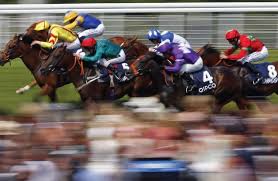Budget Blues: Why British Horseracing is Still Lost at Sea, with the BHA at the Helm
BHA cautiously shuffling papers, hoping the budget might somehow fix itself.
11/3/20244 min read


The recent Budget should have been a time for British horseracing to clear the hurdles and finally sprint down the home stretch. Yet instead, it’s like the jockeys are all riding backwards and the course stewards can’t even find the track. Greg Swift, the British Horseracing Authority’s Director of Communications, responded with a list of polite ‘concerns’ that feels less like a rallying cry and more like a weary sigh of resignation. Once again, the Treasury’s big decisions on tax and duties have landed, and once again, the BHA is standing by, clutching a fistful of wishful thinking and an empty strategy bag.
To their credit, the Treasury resisted what must have been a tempting revenue raiser: lumping on gambling duties across the board. This would have hit horseracing squarely in the face, so naturally, the BHA is pleased with the narrow escape. But what they’ve chosen not to mention is that this Budget could have offered an actual lifeline to the industry through differential taxes. Had the Chancellor decided to spare racing in favour of a bigger take from high-rolling casinos and the electronic bandits—those addictive slot machines—horseracing might have had a genuine win. But apparently, the opportunity was ignored, as if the Chancellor were more focused on a quick jog to the pub than listening to industry-specific logic.
And then, of course, we get the usual sympathetic grumblings about National Insurance Contributions (NICs) being raised to 15% for employers. But it’s the lowering of the NICs threshold, which drags in even the smallest operations, that’s really galling. Here we are, with racing businesses clinging on for dear life, only for the Treasury to throw them a lifebuoy made of lead. For the thousands of stable workers and trainers in rural areas—where racing keeps entire communities afloat—this is more than just a line item on a balance sheet. For them, it’s a question of whether the next generation of staff will even stick around when the cost of keeping them becomes unmanageable.
As for the vaunted “permanently lower” business rates multiplier for leisure businesses (set to debut in 2026-27), Swift’s forced optimism almost masks the irony of it all. Racing needs relief now, not the promise of a small break in three years’ time, by which point a few stables may well be turning into rustic Airbnbs. Even more maddening is the Treasury’s decision to raise rates on some racing businesses in 2025-26, like giving a discount on a chocolate bar and then charging for the wrapper. While these businesses scramble to understand the hit, the BHA seems to be planning another polite round of meetings and consultations—an approach that’s about as effective as trying to tame a racehorse with a biscuit.
Swift’s attempt to address inheritance tax changes is yet another symptom of the same chronic problem: vague, cautious words with very little direction. The Government’s tweaks could make it harder for family-run stables and breeders to keep their operations afloat as they get passed down generations, yet the BHA’s message on this, as ever, is a bit of diplomatic fluff about “examining” the “implications.” Has no one at the BHA noticed? The sport needs a clear, vocal strategy, not cautious inquiries. The only clear thing right now is the sound of the industry collectively scratching its head.
And then there’s the Horserace Betting Levy, or as the BHA might say in their private moments, the perennial headache that no aspirin on earth can cure. British racing relies heavily on betting revenues to stay alive, yet this so-called lifeline is now being strangled by affordability checks that turn off the very people racing depends on. Swift’s plea for Levy reform, at this point, is so familiar it may as well be copied and pasted from last year’s press release. If the BHA truly wanted change, perhaps they could take a page out of the National Lottery’s book; after all, there’s no “affordability check” when people are throwing their last pound into a scratch card.
Meanwhile, the BHA’s response to all of this? Words, and lots of them. But where’s the clear strategy? A roadmap? A vision that says, “Here’s how we’ll ensure the future of racing”? Swift’s statement is full of vague promises to “work with stakeholders” and “examine impacts,” which sounds like code for “we’ll keep having tea with the Treasury and hoping they take pity.” Racing doesn’t need tea and sympathy; it needs leadership. It needs the BHA to stop hobbling around the issues and to start publicly laying out a plan. Instead, it feels as though the BHA is perpetually scrambling to play catch-up, clutching at straws and offering nothing concrete. The Chancellor threw them a wild card, and they barely seem to know what to do with it.
Let’s not forget that last week, Sport Minister Stephanie Peacock chirped about the Government’s “commitment” to supporting horseracing, declaring it a vital part of the economy and a beloved national pastime. Well, if that’s true, you’d expect to see a bit more urgency in government policy—and indeed from the BHA itself. Instead, what we have is the BHA cautiously shuffling papers, hoping the budget might somehow fix itself.
In the end, racing’s fate remains a muddle of tax tweaks, hand-wringing, and missed opportunities. The Treasury may well have left the door open for meaningful changes down the line, but without clear direction and some honest-to-goodness leadership, British horseracing looks set to remain exactly where it is: lost at sea, with no map, no compass, and certainly no lifeboat in sight.

